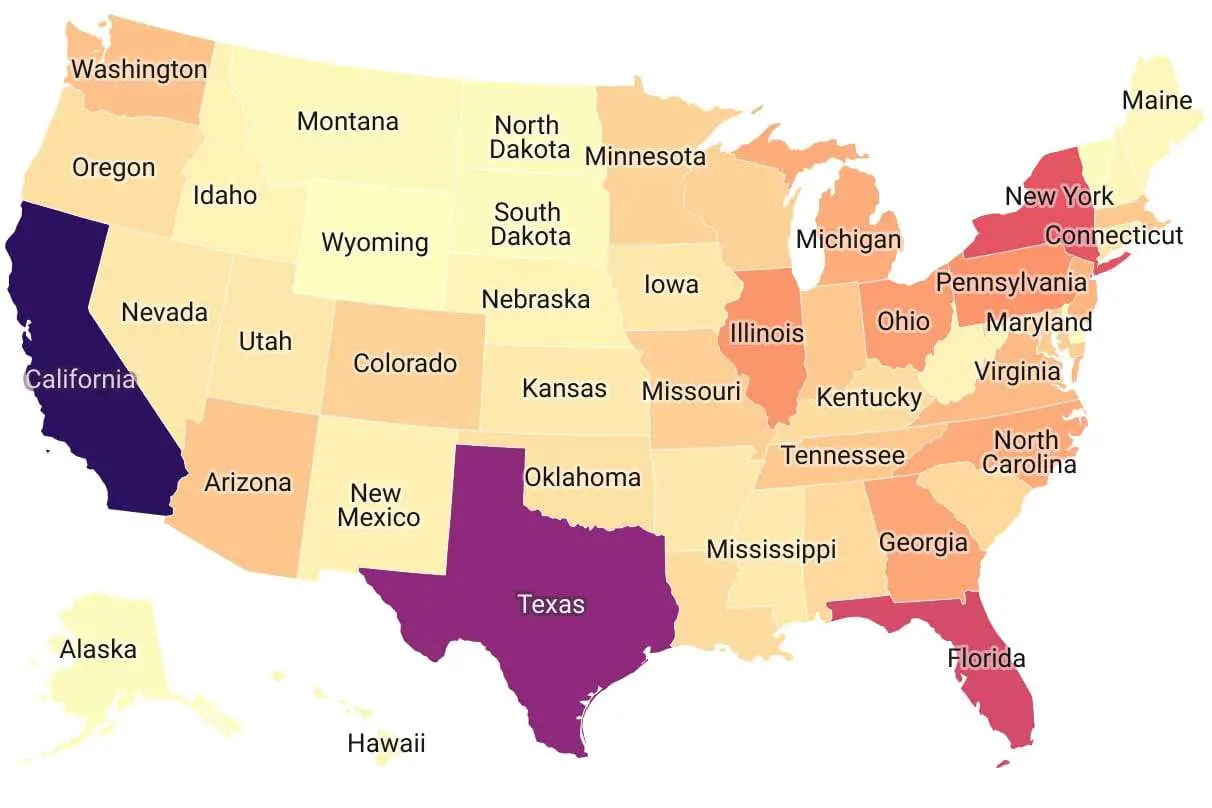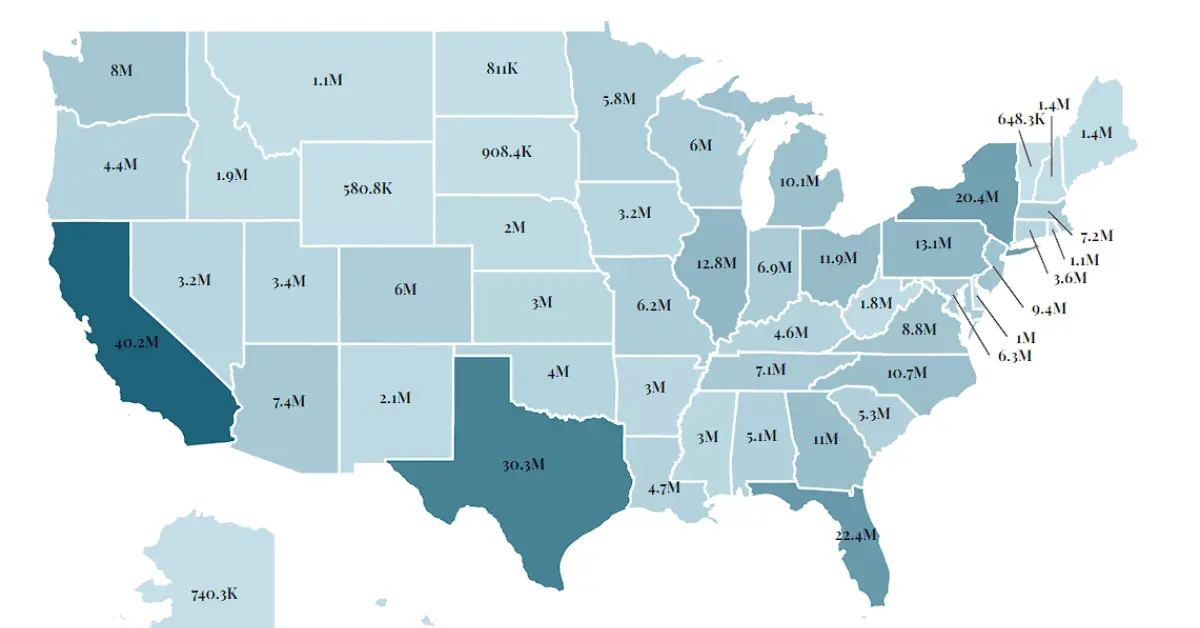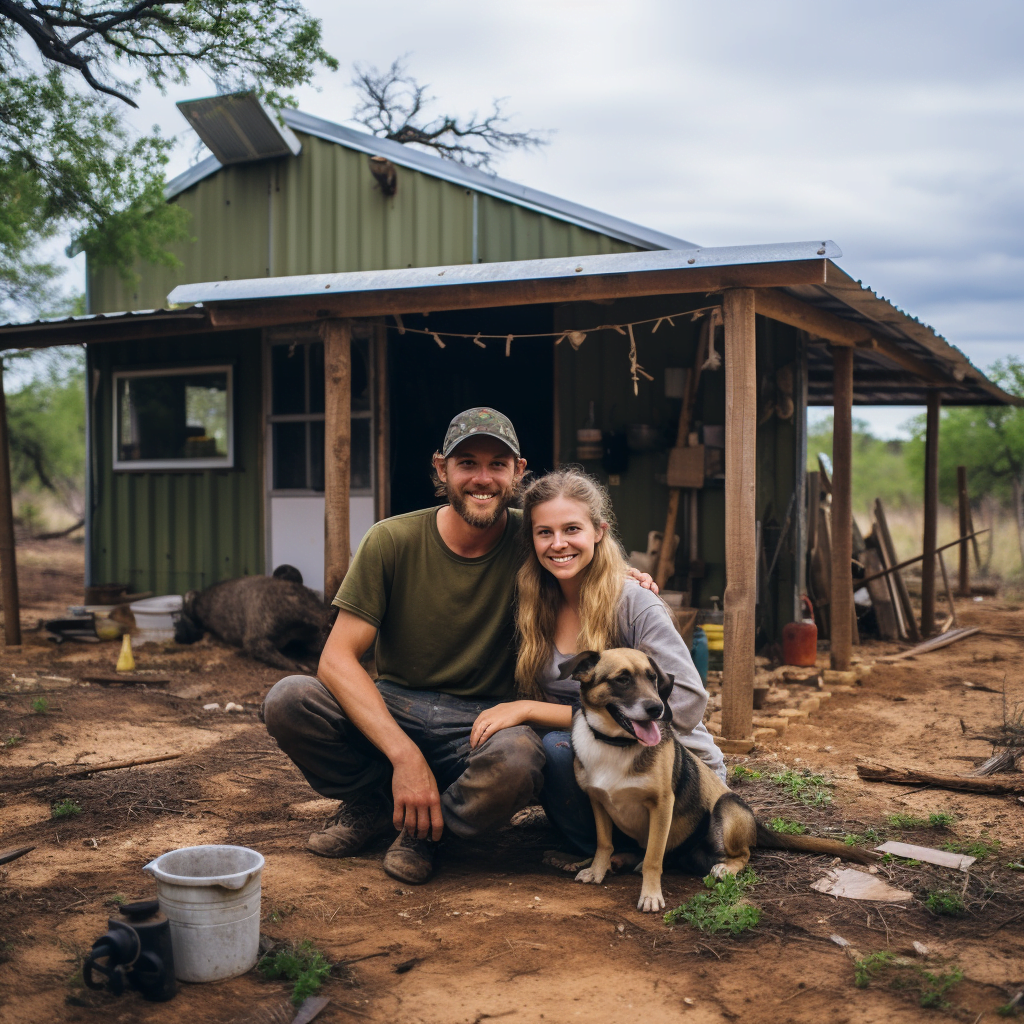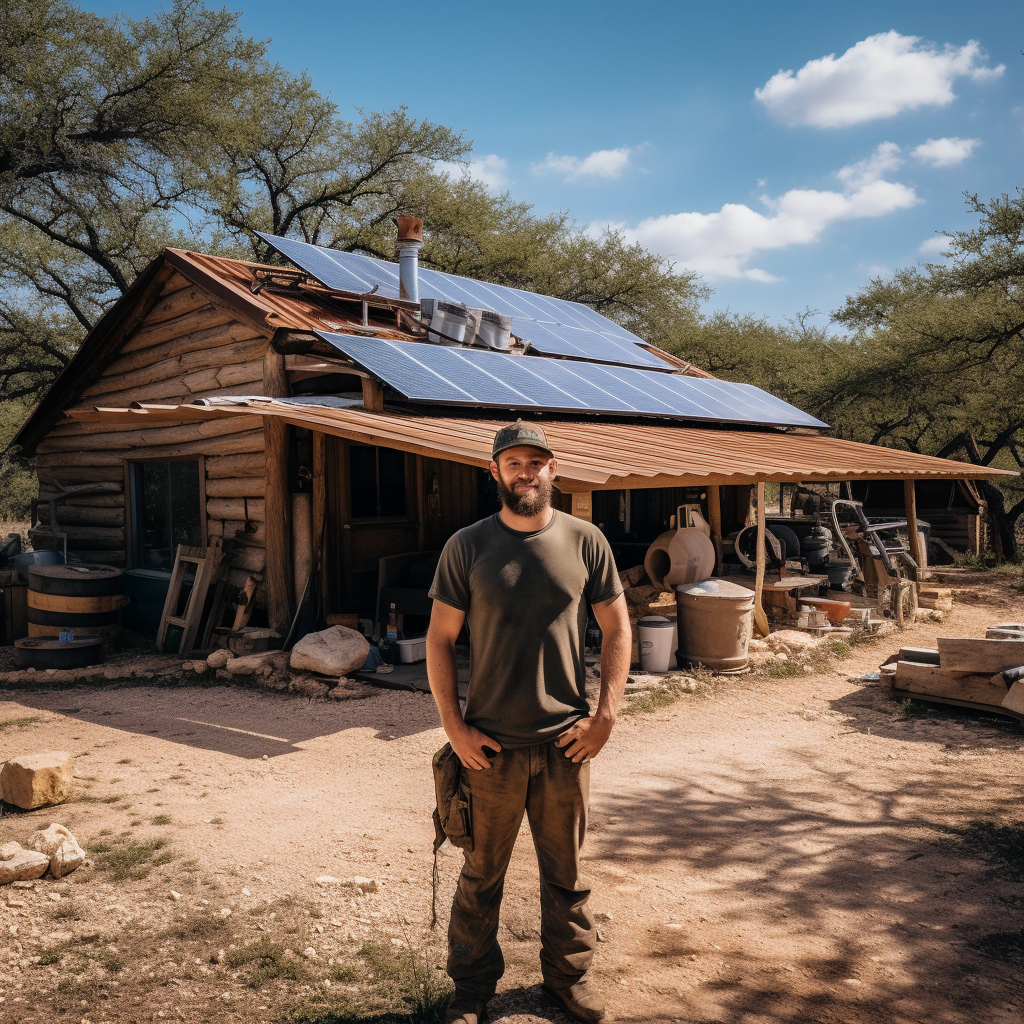Texas is a state known for its immense size and large population. With a lower cost of living compared to the national average, Texas offers opportunities for off-grid living, with both rainwater harvesting and off-grid living being legal. However, the semi-arid climate poses challenges for those living off-grid, making water storage crucial. Texas also boasts a high population density, leading to an above-average crime rate. Despite this, Texas offers various job opportunities in industries such as oil, gas, agriculture, manufacturing, and banking. The state experiences a variety of natural disasters, including wildfires, floods, tornadoes, and hurricanes. With its abundant land and sunlight, Texas is a great state for off-grid living, especially in rural regions like West Texas, the Hill Country, and parts of East Texas. Popular choices for off-grid living include areas like Big Bend, Davis Mountains, and the Texas Panhandle.
Geographical Overview

Size and Population of Texas
Texas is one of the largest states in the United States, covering an area of approximately 268,596 square miles. With its vast landmass, Texas ranks second in size, only behind Alaska. In terms of population, Texas is also among the top states with over 29 million residents. Its high population makes it a vibrant and diverse state with a rich cultural heritage.
Climate and Weather in Texas
Texas has a diverse climate due to its size and geographic location. The state experiences a mostly semi-arid climate, characterized by hot summers and mild winters. However, there are variations in climate throughout the state. The western and southern regions have a desert-like climate, while the eastern and coastal areas have a more humid subtropical climate. This diversity in climate affects different aspects of living in Texas.
Off-Grid Living in Texas
Legality and Regulations
If you are considering off-grid living in Texas, you’ll be glad to know that it is legal in the state. Texas promotes self-sufficient living and allows residents to generate their own power and collect rainwater. Additionally, the state offers various incentives and programs to encourage renewable energy adoption and sustainable living practices.
Benefits and Challenges
Off-grid living in Texas offers several benefits, such as reduced reliance on traditional utilities, cost savings, and environmental sustainability. The abundance of land and sunlight also makes Texas an ideal location for off-grid living. However, there are also challenges to consider, such as the semi-arid climate and the need to efficiently manage natural resources like water.
Rainwater Harvesting in Texas
Rainwater harvesting is an integral part of off-grid living in Texas. With limited rainfall in certain regions, capturing and storing rainwater is crucial for self-sufficiency. Fortunately, Texas allows rainwater harvesting and provides guidance on system design, water quality, and usage regulations. Implementing rainwater harvesting systems can help meet household water needs and reduce reliance on external water supplies.
Importance of Storing Water
For off-grid living in Texas, storing water is of utmost importance. The state’s semi-arid climate and occasional droughts make water conservation and storage essential. Having a reliable and sufficient water supply is crucial for daily needs, irrigation, and emergencies. Proper water storage methods, such as using rainwater storage tanks or digging wells, are vital for sustainable off-grid living in Texas.
Cost of Living and Property
Comparison to National Average
One of the significant advantages of living in Texas is its lower cost of living compared to the national average. From housing to groceries, the overall expenses tend to be more affordable in the state. This lower cost of living allows residents to save money and allocate resources to other important aspects of their lives.
Property Prices and Taxes
Texas offers relatively affordable property prices, especially when compared to other states. However, it is important to note that property tax in Texas is higher than the national average. While property ownership may come with higher taxes, the overall lower cost of living can help offset these expenses.
Lower Cost of Living in Texas
Beyond property prices, Texas provides residents with a lower cost of living across various aspects of daily life. Utilities, transportation, healthcare, and groceries are all more affordable compared to the national average. This affordability makes Texas an appealing destination for individuals seeking a more budget-friendly lifestyle.
Energy Programs in Texas
Wind and Solar Power Programs
In line with its commitment to renewable energy, Texas offers several programs and incentives to promote wind and solar power systems. The state has vast open spaces and receives ample sunlight, making it an ideal location for harnessing renewable energy. Through these programs, residents can receive financial assistance or tax incentives to install wind turbines or solar panels, thereby reducing their dependence on traditional energy sources.
Advantages of Renewable Energy
Renewable energy, such as wind and solar power, has numerous advantages for both off-grid and grid-connected living in Texas. These energy sources are abundant, sustainable, and environmentally friendly. By utilizing renewable energy, residents can reduce their carbon footprint, lower their energy bills, and contribute to a cleaner and greener future.
Suitability of Solar Power in Texas
Texas is known for its abundant sunlight, making solar power a viable option for off-grid living. The state receives an average of around 200 sunny days per year, providing plenty of potential for solar energy generation. By harnessing the power of the sun, residents can enjoy a reliable and sustainable energy source for their off-grid lifestyle.
Population and Cities

High Population Density
Texas has a high population density, with its large cities attracting residents from all walks of life. The state’s booming economy, diverse job opportunities, and cultural attractions make it a desirable destination for many. However, the high population density also means that certain areas may be more crowded or have increased traffic.
Crime Rate in Texas
With a high population comes a slightly above-average crime rate in Texas compared to the national average. However, it is important to note that crime rates can vary significantly depending on the specific city or region. Some areas have lower crime rates, providing a safer environment for residents.
Major Cities in Texas
Texas is home to numerous major cities, each with its own unique characteristics and attractions. Houston, San Antonio, Dallas, Austin, and Fort Worth are among the largest cities in Texas and offer diverse cultural experiences, job opportunities, and amenities. These cities provide a wide range of options for individuals looking to settle in Texas.
Climate and Agriculture
Various Climates in Texas
Texas experiences a variety of climates due to its size and geographical features. The western and southern regions have drier and hotter climates, resembling a desert environment. The eastern and coastal areas, on the other hand, have a more humid subtropical climate with higher rainfall. The diverse climates present different opportunities and challenges for agriculture in Texas.
Water Usage for Crop Farming
Agriculture plays a significant role in Texas’s economy and food production. However, the semi-arid climate of many regions presents challenges for crop farming. Water scarcity and efficient water usage are essential for successful agricultural practices in Texas. Farmers employ various techniques, such as drip irrigation and water-saving technologies, to maximize crop yields while conserving water resources.
Wildlife in Texas
Texas is home to a diverse range of wildlife, thanks to its varied landscapes and climates. The state boasts a rich biodiversity, with species such as deer, antelope, sheep, alligators, and a variety of fish populating the land and waterways. The abundant wildlife in Texas adds to its natural beauty and offers opportunities for outdoor enthusiasts to explore and appreciate nature.
Transportation and Access
Road Network in Texas
Texas has an extensive road network that connects major cities, towns, and rural areas. The state boasts a well-developed highway system, making it easy to travel within and across regions. Whether you are exploring the cities or venturing into more remote areas, the road network in Texas offers convenience and accessibility.
Remote Areas and 4×4 Vehicles
While the road network in Texas is generally good, some areas may require a 4×4 vehicle for access. Remote regions, particularly those with rugged terrain or limited infrastructure, may necessitate off-road capabilities. Whether you are planning to live off-grid or embark on outdoor adventures, having a reliable 4×4 vehicle can ensure that you can reach your desired destinations.
Job Opportunities
Industries in Texas
Texas has a diverse economy with job opportunities across various industries. Traditionally, industries such as oil, gas, and agriculture have played a significant role in the state’s economy. However, Texas also boasts a robust manufacturing sector, along with a growing presence in the banking and finance industry. These industries provide ample job opportunities for individuals looking to establish a career in Texas.
Oil, Gas, and Agriculture
The oil and gas industry has long been a dominant force in Texas’s economy. With abundant natural resources, the state is a major player in the energy sector, offering numerous job opportunities in exploration, production, and refining. Additionally, the agriculture industry, including livestock, crops, and farming, continues to thrive in Texas, providing employment and contributing to the state’s economic growth.
Manufacturing and Banking
Texas has emerged as a manufacturing hub, attracting businesses in various sectors such as aerospace, automotive, and electronics. The state’s favorable business environment, skilled workforce, and logistical advantages make it an attractive location for manufacturing companies. Furthermore, Texas’s robust banking and finance sector offers career opportunities in areas such as commercial banking, investment banking, and wealth management.
Crime Rate and Safety
Crime Rate in Texas
While Texas experiences a slightly above-average crime rate compared to the national average, it is important to note that crime rates can vary significantly depending on the specific city or region. Urban areas may have higher crime rates, while rural regions often have lower rates. Understanding the crime statistics of a particular area is crucial for individuals seeking a safe and secure living environment.
Areas with Lower Crime Rates
While crime rates in Texas can be higher in some areas, there are also regions with lower crime rates. Rural areas, small towns, and suburban communities often have lower crime rates compared to larger cities. These areas offer a more peaceful and secure living environment, attracting individuals seeking safety and tranquility.
Natural Disasters in Texas
Texas is prone to various natural disasters, including wildfires, floods, tornadoes, and hurricanes. The state’s size and diverse climate make it susceptible to different weather-related events. Residents must be prepared and aware of the risks associated with these natural disasters, especially if considering off-grid living. Taking necessary precautions, such as acquiring insurance and implementing safety measures, is crucial to mitigate potential risks.

Best Places for Off-Grid Living
Rural Regions in Texas
Texas offers a vast expanse of rural regions that are suitable for off-grid living. Areas like West Texas, the Hill Country, and parts of East Texas present opportunities for self-sufficient living in tranquil surroundings. These regions provide the necessary space and natural resources for off-grid living while offering a peaceful escape from the bustling city life.
Popular Choices for Off-Grid Living
When it comes to off-grid living in Texas, several areas have emerged as popular choices. Big Bend, known for its stunning natural beauty and remote location, attracts individuals seeking solitude and a deeper connection with nature. The Davis Mountains, with their scenic landscapes and abundant wildlife, offer a serene setting for off-grid living. Additionally, the Texas Panhandle, characterized by wide-open spaces and a strong sense of community, provides opportunities for self-sufficiency and a simpler way of life.
Solar Power in Off-Grid Living
Solar power is a viable and popular option for off-grid living in Texas. With its abundant sunlight, the state offers ideal conditions for generating solar energy. Installing solar panels can provide a reliable source of electricity, enabling off-grid residents to meet their energy needs sustainably. Moreover, solar power systems can help reduce reliance on other energy sources and lower long-term costs.
In conclusion, Texas offers a wide range of opportunities for off-grid living. With its vast land, abundant sunlight, and varied climates, the state provides an ideal environment for those seeking self-sufficiency and sustainable living. While challenges such as the semi-arid climate and crime rates should be considered, Texas’s lower cost of living, renewable energy programs, and abundant natural resources make it an appealing choice for individuals looking to embrace an off-grid lifestyle.




